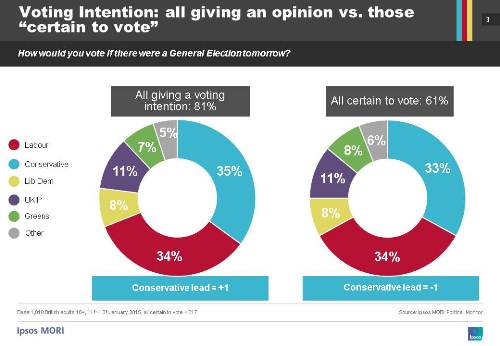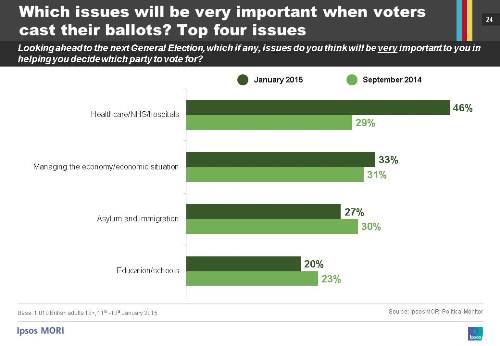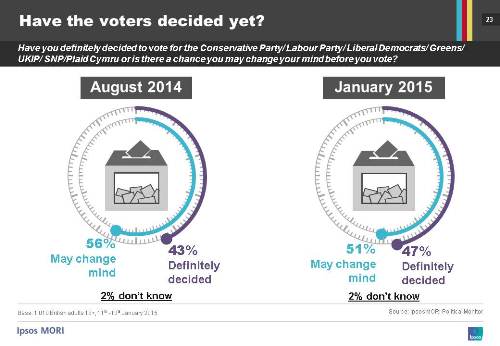NHS leads economy and immigration as top vote-deciding issue
Labour up five points but still neck-and-neck with Conservatives
CON 33 (+1); LAB 34 (+5); LIB DEM 8 (-1); UKIP 11 (-2); GREEN 8 (-1)
Ipsos MORI’s first Political Monitor of 2015 shows that the Conservatives and Labour are neck-and-neck, with Labour’s vote share increasing five points (from 29% in December 2014) to 34%. The other parties are holding steady though, with the Conservatives up one point on 33% and the Liberal Democrats down one point on 8%, joined by the Greens who are also on 8%. UKIP are down two points on 11%.

Healthcare-related issues have emerged as the dominant issue behind Britons’ choice of party. Over four in ten (46%) say this is a very important issue for them when weighing up their ballot choice. This is up 17 points since September 2014, when 29% cited this issue. Managing the economy is second on 33% (from 31% in September). Asylum and immigration is the third-most cited issue, with just over a quarter (27%) mentioning this area (down from 30% in September 2014). One in five (20%) mention education as a top election issue, with nine percent each mentioning the EU and unemployment.

Net satisfaction (% satisfied minus % dissatisfied) in David Cameron’s performance as Prime Minister is at its highest level since March 2012 at -11, with 41% satisfied and 52% dissatisfied. This rise in approval also extends to the government; a third (33%) are satisfied with its performance, while 56% are dissatisfied, giving a net satisfaction rating of -23 (up from -31 in December).
Nigel Farage’s net satisfaction rating has also recovered somewhat since last month’s lowest ever score of -20; this month’s figure is -13. Ed Miliband and Nick Clegg continue to lag behind Messrs Farage and Cameron in the ratings: 26% are satisfied and 61% are dissatisfied with Mr Miliband, giving a net rating of -35 (although up from -38 last month), while 25% are satisfied and 64% are dissatisfied with Mr Clegg, giving a net satisfaction rating of -39 (roughly the same as last month's -40).
Half of Britons expressing a voting intention (51%) say they may change their mind on who to vote for, with 47% saying they have definitely decided (2% don’t know). Britons have become slightly more sure on their choice since August 2014, when 56% said they may change their mind (43% definitely decided, 2% don’t know). UKIP voters are the most likely to have made up their mind; 56% say they have definitely decided who they’ll vote for, compared to 52% of Labour supporters and 49% of Conservative backers. However, more than eight in ten (85%) Liberal Democrat supporters say they may still change their minds.

Gideon Skinner, Head of Political Research at Ipsos said:
"The first skirmishes of the campaign have been to Labour's advantage, with their strongest card of the NHS taking a clear top spot in the public's concerns. But despite the dominance of the NHS and Labour's rise the two main parties are still only neck-and-neck, and with half of voters saying they may change their minds there is a long way to go.”
Downloads
Technical Note:
Ipsos interviewed a representative sample of 1,010 adults aged 18+ across Great Britain. Interviews were conducted by telephone 11-13 January 2015. Data are weighted to match the profile of the population.



